Introduction
Sales objections are a natural part of any B2B sales conversation. The key to success isn’t avoiding them; it’s knowing how to handle objections in sales effectively. When handled correctly, objections are opportunities to uncover a prospect’s true needs, build trust, and guide them toward a solution. In this guide, we break down the psychology behind objections, provide 20+ real-world examples, and show you how Pepsales AI helps your team respond seamlessly.
What Is a Sales Objection?
A sales objection is any hesitation, doubt, or concern that prevents a prospect from moving forward in the buying process. It might stem from budget, timing, authority, or need, but it always offers a window into how the prospect thinks.
Understanding how to handle sales objections starts with recognizing that objections don’t equal rejection. Often, they’re signals that your prospect needs more clarity, reassurance, or evidence of value. By refining your objection-handling process, you can turn resistance into opportunity.
4 Common Types of Sales Objections (and What They Really Mean)
1. Lack of Budget
- What it means: Prospect can’t justify the cost.
- Impact: May require demonstrating ROI or cost savings.
2. Lack of Authority
- What it means: Prospect isn’t the decision-maker.
- Impact: Requires uncovering decision-makers and influencers.
3. Lack of Need
- What it means: Prospect doesn’t see value in the solution.
- Impact: Requires clarifying pain points and benefits.
4. Lack of Urgency
- What it means: Prospect isn’t motivated to act now.
- Impact: Use urgency triggers like deadlines, risk of inaction, or opportunity cost.
20 Common Sales Objections and How to Handle Them (With Examples)
1. We’re already using a competitor.
Why the buyer says this: They feel loyalty or comfort with their current provider and worry about switching.
Best response: "I understand you’re happy with your current provider. May I ask what you like most? Many clients switched to us because we complement and enhance those benefits."
Example:
Prospect: "We’re using [Competitor]."
You: "That’s great to hear. What features do you rely on? We help clients get even better results by building on those."
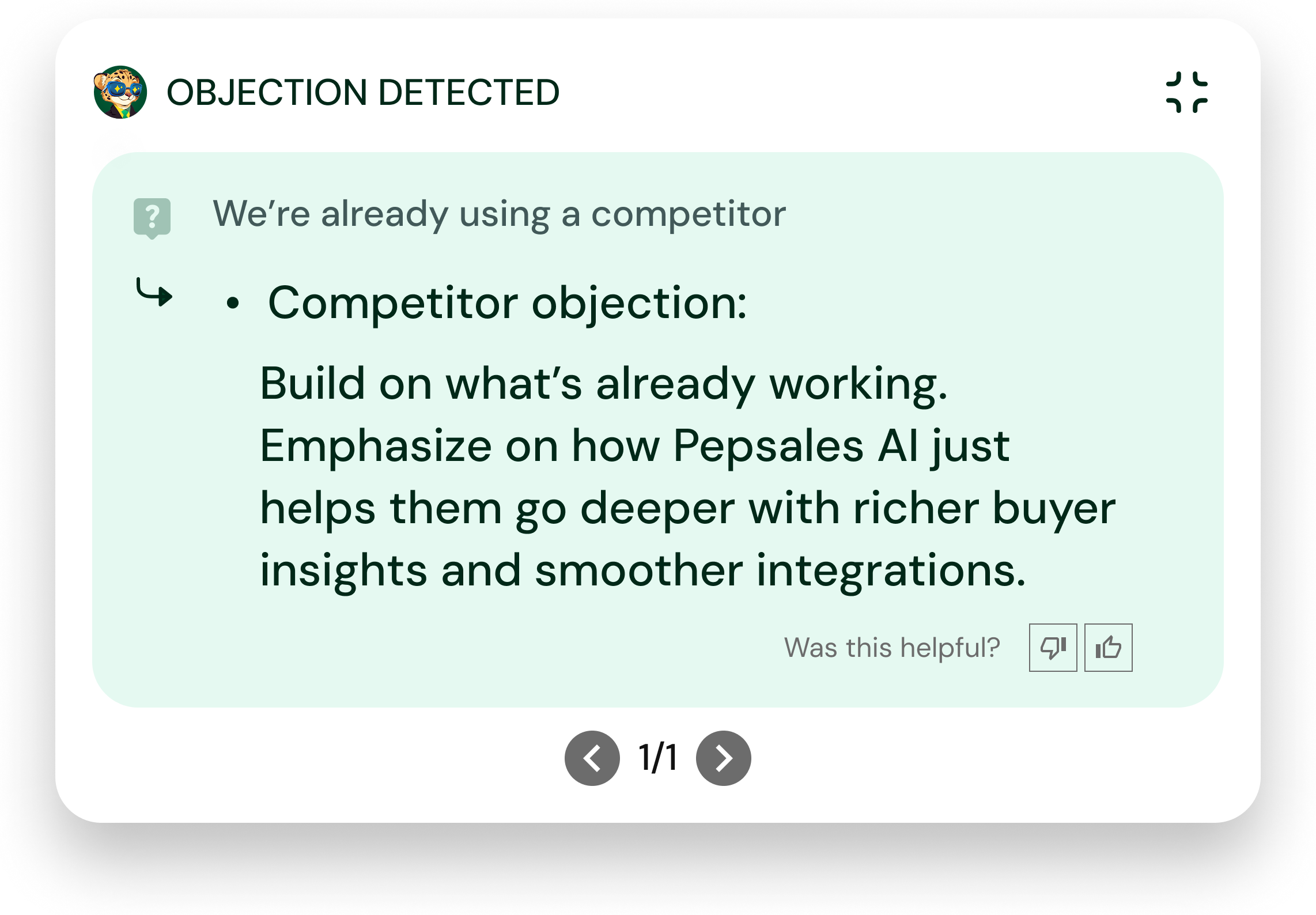
2. Your price is too high.
Why the buyer says this: They’re uncertain about ROI or value relative to cost.
Best response: "Let’s explore how similar customers saw a 20% cost reduction with us. Can I walk you through the ROI calculation?"
Example:
Prospect: "Your price is high."
You: "We’ve helped others recover costs quickly by boosting efficiency. Can I share a case study?"
See Handling Objections in Sales Calls Like a Pro.
3. I don’t see ROI potential.
Why: They need proof your solution solves their problem measurably.
Best response: "I’d love to share success stories and offer a pilot program so you can see results risk-free."
Example:
Prospect: "Not convinced about ROI."
You: "We track KPIs closely and pilot for proof. Would you like to see what a similar client achieved?"

4. I’m not interested right now.
Why: Timing may be off or prioritization differs.
Best response: "When would be a better time? Meanwhile, what challenges are you focusing on?"
Example:
Prospect: "Not interested now."
You: "Understood. What’s your main focus this quarter? I can send helpful insights."
Explore more: How AI Helps Sales Teams Handle Objections.
5. I’m busy, call me later.
Why: Prospect is overwhelmed or avoiding sales talk.
Best response: "I respect your time. When’s a good 10-minute window for you?"
Example:
Prospect: "Call me later."
You: "How about tomorrow morning? I’ll keep it brief."
6. How did you get my contact info?
Why: Prospect wants transparency on outreach source.
Best response: "I found your profile via [source] and thought our solution could add value to your role."
Example:
Prospect: "How did you get my number?"
You: "We connect with professionals in your space to share relevant solutions."
7. I’ve never heard of your company.
Why: Unfamiliar brand causes hesitation.
Best response: "We’ve helped companies similar to yours. Here are some success stories."
Example:
Prospect: "I don’t know your company."
You: "Let me share client results relevant to your industry."
8. This looks too complex for our team.
Why: Prospect fears disruption or steep learning curve.
Best response: "We provide guided onboarding and training for smooth adoption."
Example:
Prospect: "Too complex for us."
You: "Our support team ensures an easy ramp-up, minimizing disruption."
9. We’re using this budget elsewhere.
Why: Budget is allocated, or spending caps exist.
Best response: "I understand budget constraints. Let’s explore phased options or ROI that might free up funds."
Example:
Prospect: "Budget tied up elsewhere."
You: "We offer flexible plans and have helped clients reallocate budgets by demonstrating quick wins."
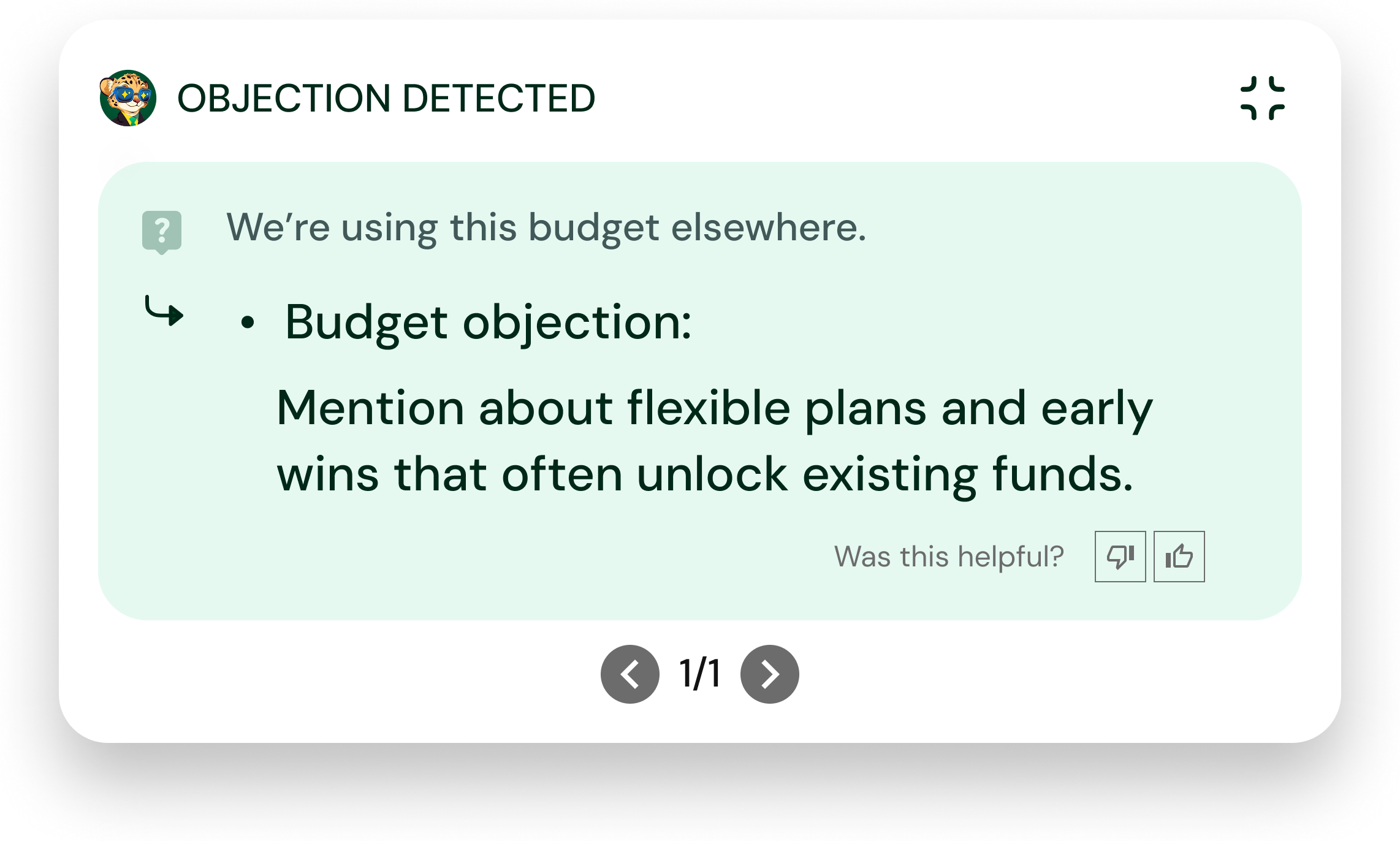
10. Can you email me the details?
Why: Prospect wants time to review or avoid conversation.
Best response: "Absolutely. Can we schedule a follow-up to discuss your questions?"
Example:
Prospect: "Email me info."
You: "Sure. When shall we reconnect to address any questions?"
11. I saw a bad review about you.
Why: Negative feedback raises trust issues.
Best response: "Thanks for mentioning that. We’ve addressed those concerns thoroughly and here’s how we’ve improved."
Example:
Prospect: "I read a bad review."
You: "We take feedback seriously and continually improve our product and service."
12. We’re happy with the way things are.
Why: Prospect has status quo bias or contentment.
Best response: "Happy to hear that. Could I share ways we’ve enhanced similar setups?"
Example:
Prospect: "We’re fine as is."
You: "Great! Let me show how we add incremental value without disruption."
13. You don’t have X feature.
Why: Missing features worry prospects about fit.
Best response: "That’s a feature we’re actively working on. Meanwhile, here’s how our existing features deliver value."
Example:
Prospect: "Missing feature X."
You: "We’re adding it soon; meanwhile, many clients benefit from our current capabilities by…"
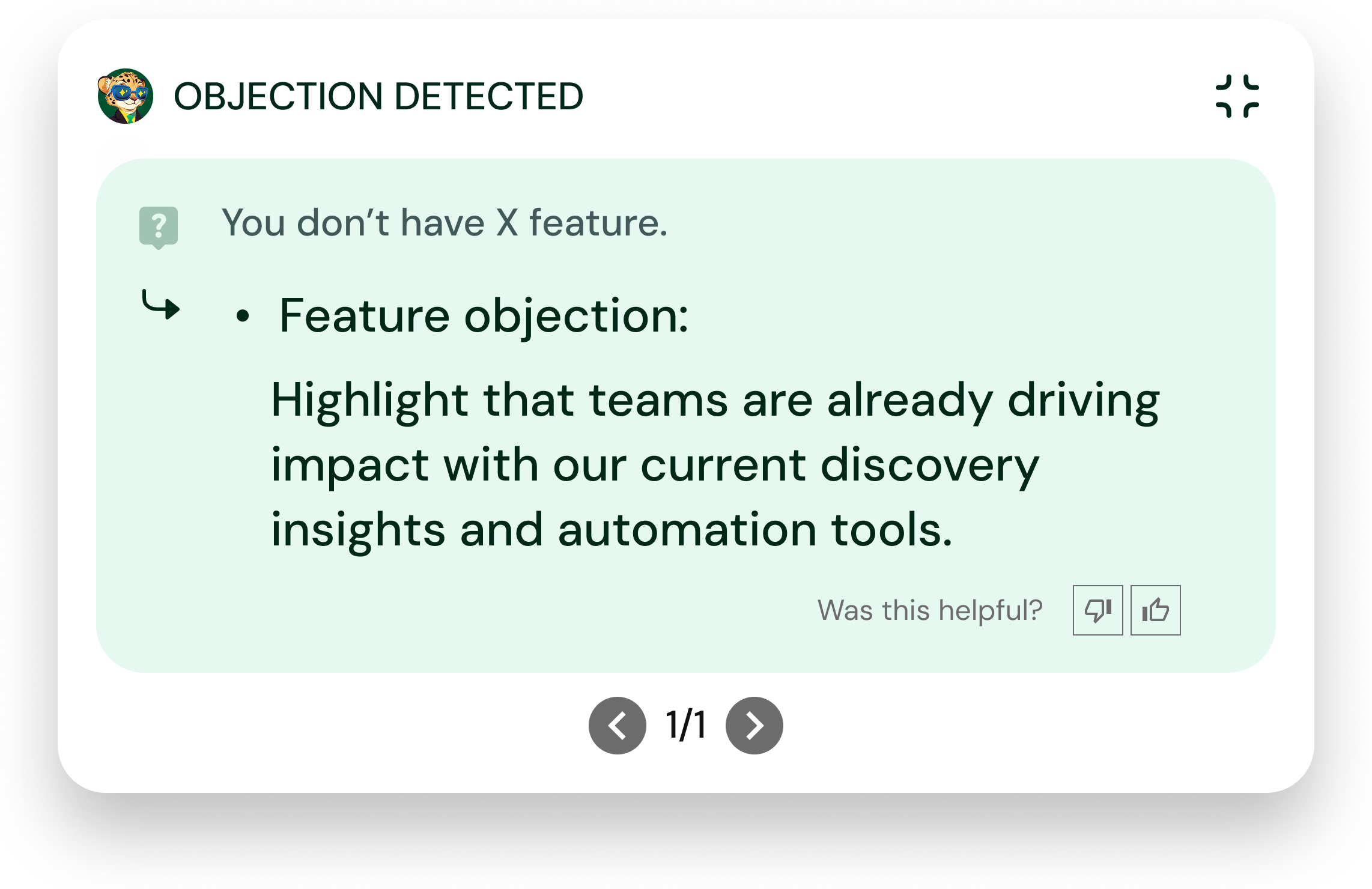
14. I’ll compare quotes first.
Why: Prospect wants to shop around or delay decision.
Best response: "Of course. Can I highlight what sets us apart beyond price?"
Example:
Prospect: "Comparing quotes."
You: "Competitive pricing is just part of it; let me share our value differentiators."
15. We don’t have a big enough team.
Why: Prospect worries about scale and relevance.
Best response: "We scale easily from teams of all sizes, and flexible pricing fits small teams well."
Example:
Prospect: "Our team is too small."
You: "Many small teams thrive using our solution. Let’s discuss your needs."
16. We don’t need this right now.
Why: No immediate need or priority.
Best response: "Understood. Can I share insights about potential future challenges?"
Example:
Prospect: "Not needed now."
You: "Happy to share info that might assist your planning."
17. Beep… (Voicemail objections)
Why: Prospect unavailable or avoiding.
Best response: Leave a concise and value-driven voicemail to encourage callback.
Example:
"Hi, this is [Name], just wanted to share a quick value about how our solution helped others in your industry. Looking forward to connecting."
18. Can you check back next quarter?
Why: Timing or budget cycles.
Best response: "Absolutely. Meanwhile, can I keep you updated with relevant content?"
Example:
Prospect: "Check back later."
You: "Will do. I’ll send occasional updates."
19. I don’t have the time for a demo.
Why: Prospect is too busy or uninterested.
Best response: "What if we keep it under 15 minutes? I’ll tailor it to your key questions."
Example:
Prospect: "No time for demo."
You: "I can customize a quick demo respecting your schedule."
20. We’ve tried something similar before - it didn’t work.
Why: Previous disappointment or failure with similar solutions.
Best response: "I hear that. Can I share how our approach is different and client success stories?"
Example:
Prospect: "Tried this before, no luck."
You: "We differentiate through [unique method]. Let me show evidence of success."

The Psychology Behind Sales Objections (What’s Really Going On)
Sales objections often feel like roadblocks, but underneath them lie deep psychological triggers. Here’s a clearer look at the key forces shaping objections and how to overcome them effectively.
Fear of Change
What it is:
Change introduces uncertainty, and humans instinctively seek stability and predictability, even if the current situation isn’t perfect. This fear makes prospects hesitant to disrupt their workflows, teams, or status quo.
Sales Impact:
Even if your solution offers clear benefits, prospects may resist because they worry about the hassle, risks, or confusion that comes with change.
What it sounds like:
- "We've always done it this way."
- "Our team won’t adopt this quickly."
- "It sounds great, but there are too many moving parts."
How to overcome it:
- Offer detailed onboarding steps and realistic timelines.
- Share successful transition case studies from similar clients.
- Use language like “building on what you already do” instead of “completely changing.”
Examples:
If selling a new CRM, a prospect might say, “We’ve had the old one for five years; migrating feels risky.” Acknowledge their fear: "I understand the concern. Here's a step-by-step migration plan and testimonials from clients who switched with minimal disruption."
Risk Aversion
What it is:
People fear decisions that might backfire. Especially in B2B, where reputations, budgets, and careers are on the line, many prospects prefer inaction because it feels safer than a wrong move.
Sales Impact:
Prospects delay decisions or avoid commitments, prolonging the sales cycle.
What it sounds like:
- "Let me think about it."
- "Can we revisit this next quarter?"
- "I’m not sure this is the right move right now."
How to overcome it:
- Clearly quantify ROI with conservative estimates.
- Highlight low-risk options like pilots or month-to-month trials.
- Share examples of industry leaders or competitors using your product.
Examples:
When a mid-level manager asks, “What if this doesn’t deliver the ROI my CFO expects?” respond with, “We can start with a 3-month pilot and I’ll show ROI benchmarks from similar clients to reduce your risk.”
Cognitive Dissonance
What it is:
This is the discomfort when new ideas challenge existing beliefs or investments. Prospects often reject new solutions that implicitly suggest their current systems or decisions are flawed.
Sales Impact:
Even when your product is objectively better, prospects may cling to prior choices due to pride, sunk costs, or loyalty.
What it sounds like:
- "We’ve already invested in a similar solution."
- "I think we’re doing fine."
- "This feels like overkill for us."
How to overcome it:
- Frame your solution as complementary, not a replacement.
- Avoid telling prospects “you should” do things differently; focus on possibilities.
- Validate their current choices before suggesting improvements.
Examples:
If a CTO says, “We built an internal tool, so we don’t need this,” reply, “That’s impressive! Many of our clients started that way and now use our solution to scale their existing systems faster.”
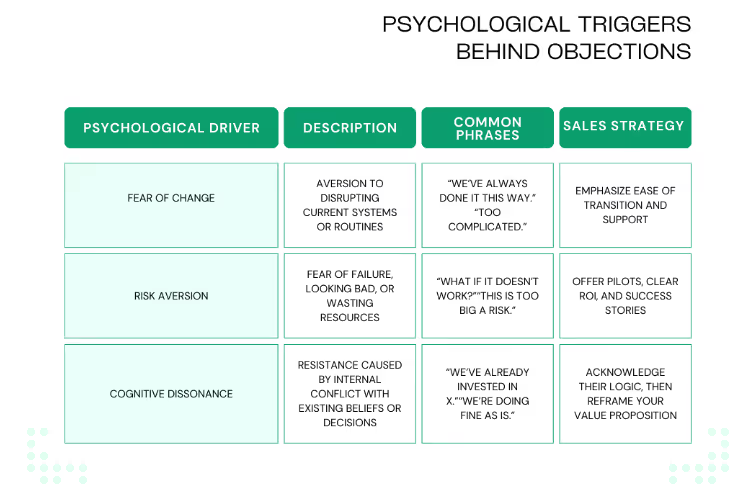
The 7-Step Method to Handle Any Sales Objection (The S.T.A.R. Framework)
1. Stop & Listen
The first and most crucial step is to pause and let your prospect fully express their concern without interruption. Allowing them to speak openly builds trust and prevents resistance from escalating.
2. Think & Acknowledge
Take a moment to process what you heard and empathize with their feelings. Acknowledge the objection sincerely to show that you understand their perspective and care about their concerns.
3. Ask Clarifying Questions
Dig deeper by asking open-ended questions that uncover the real root of the objection. This helps you separate surface-level concerns from the true barriers, ensuring your response is targeted and effective.
4. Respond with Value
Address the objection by focusing on how your solution aligns with the prospect’s goals. Highlight benefits, tailor your pitch to their needs, and position your product as a valuable answer to their challenges.
5. Reinforce with Social Proof
Boost your credibility by sharing relevant case studies, testimonials, or demo examples. Social proof reassures prospects that others like them have overcome similar doubts and benefited from your solution.
6. Reconfirm Understanding
Check in with the prospect to ensure your explanation has addressed their concern fully. This step confirms alignment and signals your willingness to listen and adapt.
7. Transition Back to Value
Once the objection is resolved, smoothly redirect the conversation towards your product’s value and the next actionable step, keeping the sales momentum alive.
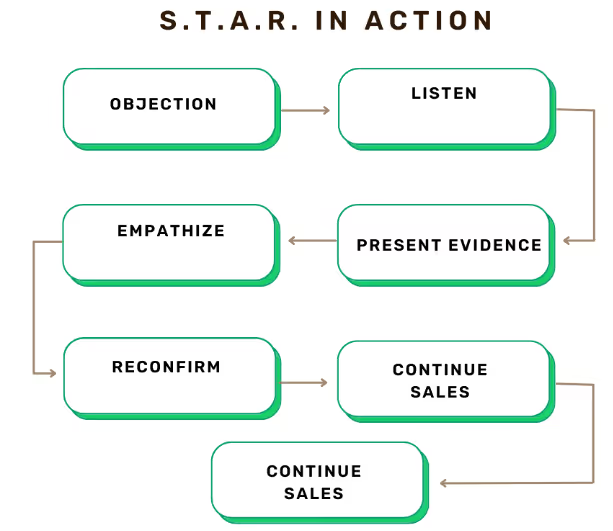
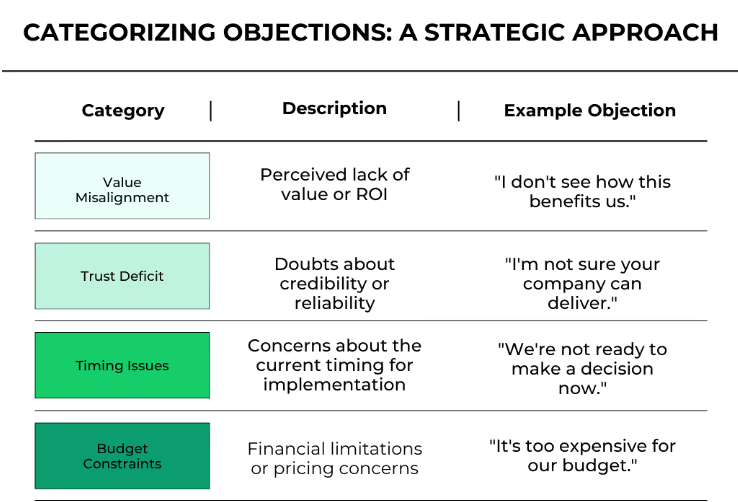
Tools That Help You Handle Sales Objections Effectively
Pepsales AI is a game-changer. It helps sales teams:
- Track objections in real time
- Suggest tailored scripts and responses
- Provide data-driven insights to improve objection handling
How to Handle Price Objections in Sales
- Understand the Concern: Ask why the price feels high.
- Show ROI: Break down financial benefits.
- Compare Alternatives: Highlight long-term savings vs. competitors.
- Use a Template: Pepsales AI offers ready-to-use objection-handling scripts for price negotiations.
Keywords: handling price objections, pricing objections, handling price objections in sales template
Key Metrics to Measure Objection-Handling Success
To continually improve, it’s vital to track how well your team manages objections. Key performance indicators (KPIs) include:
- Objection Conversion Rate: Percentage of objections successfully resolved leading to progression in the sales cycle.
- Sales Cycle Length: Effective objection handling shortens decision times.
- Win Rate on Deals with Objections: Measures the ratio of closed deals where objections were present.
- Call Quality Scores: Assess reps’ ability to respond empathetically and with evidence.
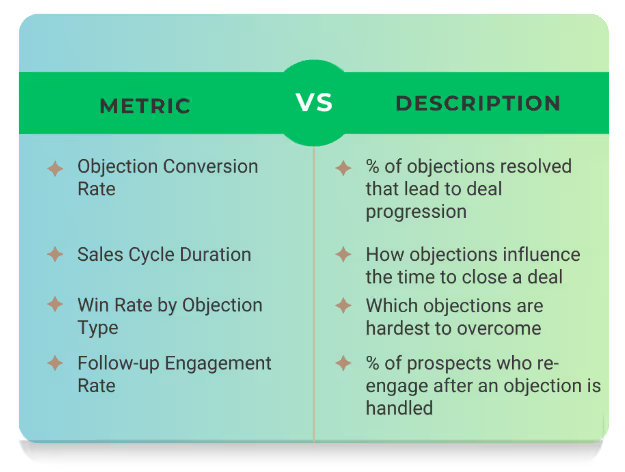
Conclusion - Turning ‘No’ into ‘Next Opportunity’ in Sales Calls
Handling sales objections well isn’t about beating a buyer down, it’s about understanding, empathy, and precision. Every objection reveals a hidden “no” that can be gently transformed into a “next opportunity.” Using proven sales objection handling techniques combined with AI-powered tools like Pepsales AI, sales reps can listen deeply, respond thoughtfully, and guide conversations back to value. This disciplined approach not only boosts confidence but also increases close rates and builds lasting relationships.
Mastering how to handle objections in sales examples means embracing that each objection is a step closer to the sale when handled with care. With the right mindset, framework, and technology, the “no” you hear today becomes the deal you close tomorrow.
“Book a demo to turn ‘No’ into revenue with Pepsales AI”
FAQ’s
1. How do you handle objections in sales?
To handle objections, actively listen without interrupting, empathize to show understanding, then ask clarifying questions to identify the root concern. Address the objection by sharing tailored value and evidence such as case studies or testimonials. Confirm the prospect’s concern is resolved before smoothly transitioning the conversation back to your product’s benefits and next steps.
2. What are the 3 F’s for handling objections?
The 3 F’s stand for Feel, Felt, Found. First, empathize and acknowledge how the prospect feels about the objection. Then, relate by sharing how others have felt the same way. Lastly, explain what those customers found usually a positive result or unexpected benefit after using the product. This approach builds rapport and eases concerns naturally.
3. Give three examples of objections during the sales process:
- “We’re already using a competitor,” which shows comfort with their current solution.
- “Your price is too high,” often masking concerns about value or ROI.
- “I’m busy right now,” a polite deferral or time issue requiring respectful follow-up.
4. What are the 5 steps for objection handling?
The key steps are: listen carefully to understand, ask open questions to dig deeper, respond with tailored solutions supported by facts, confirm the objection is fully addressed, and then transition the discussion back to value and clear next steps to keep momentum.
5.What is the best way to respond to a sales objection during a live call?
The best approach is to actively listen, empathize with the concern, address it with relevant evidence or examples, and reconfirm understanding before continuing the conversation.
6. Why do prospects raise objections in the first place?
Most objections stem from fear of change, lack of trust, unclear value, timing concerns, or budget constraints. Understanding the psychology behind them helps tailor your response effectively.
7. What tools can help me overcome objections in real time?
AI-driven tools like Pepsales AI Copilot provide live call support, tag objections, and suggest rebuttals based on buyer persona, making it easier to respond confidently.
8. How should I handle budget objections in B2B sales?
Break down the ROI, offer flexible pricing options if available, and shift the focus to the long-term value or cost of inaction. Include case studies to reinforce credibility.
9. Can handling objections shorten the sales cycle?
Yes, resolving objections early builds trust and clarity, which often accelerates decision-making and reduces sales cycle length.
10. How does objection handling impact close rates?
Sales reps who effectively manage objections are statistically more likely to close deals. Metrics like objection conversion rate and post-objection engagement rate directly correlate with higher win rates.





.avif)




.avif)
.avif)
